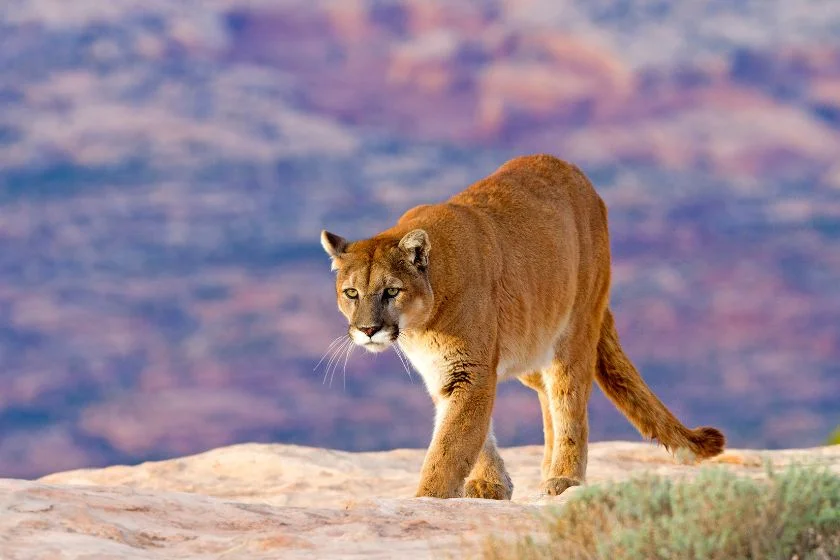If you are outdoorsy, you need to know how to survive a cougar attack or, better still, avoid a dangerous encounter with one.
Cougars are generally quiet animals that stay away from human contact and can be considered elusive.
Even its hunting method requires being elusive as it prefers ambushing its prey to going head-on.
Despite this elusiveness, the cougar is a wild creature and thus dangerous. Some recorded attacks show how deadly this creature can be.1
Surviving a cougar attack involves courage, wit, and quick actions. Cougars are already wary of humans, which makes it easier for you to scare them off than it is to chase away a lion or a tiger.
Let’s explore how to deal with a cougar in the wild and ways to avoid an encounter with them.
Cougar: An Overview

The cougar is also called the mountain lion, the panther, or the puma. It is a member of the Felidae family and is quite large, sometimes weighing over 200 pounds.
The cougar is the 4th largest cat in the world, and the 2nd largest in the New World, superseded only by the jaguar.
That said, cougars are more related to smaller felines, including the domestic cat.
Cougars are natives of the Americas, ranging from Canada down to South America.
Though called the mountain lion, it adapts to a variety of habitats, including all forest types, lowlands, mountainous deserts, and open areas.
These animals are carnivores, feeding mainly on ungulates as well as smaller prey like rodents.
Though a good hunter, it is not an apex predator. It faces competition from other animals like the American black bear, the grizzly, and wolves.
Are Cougars Dangerous?

Cougars are generally scared of humans and would rather walk away than fight, so attacks on humans are rare.
They also don’t consider humans as natural prey, so if they ever prey on a human, it would be learned behavior.
That said, there’s still a lot to be cautious about with these cats.
Humans are constantly expanding, and because cougars are widespread across the Americas, their paths cross ours.
This makes them more comfortable around humans, which could lead to bolder behaviors.
Females with cubs tend to be more aggressive. You should also expect more attacks during the late spring and summer when juveniles go on a fresh hunt. Starving cougars are also likely to attack.
So while attacks are rare, you should adopt the cliche “better safe than sorry” when facing a cougar.
How to Survive a Cougar Attack – Safety Tips

1. Watch out for signs of attack
When a cougar sights you, the first thing to look out for is if it plans on attacking.
If it retreats, there is no need to aggravate it into thinking you’re a threat; simply step away and let it leave.
However, know that there’s a danger if it stares fixedly at you, especially at a close distance.
It will also crouch with its tail swinging, the position of attack.
2. Back away slowly (and try not to run)
If number 1 is certain, you might be tempted to take to your heels. However, running from a wild animal isn’t advisable as you only give it the incentive to follow you.
It’ll either think you’re prey or feel threatened. Either way, you’re sure to have a cougar behind you if you run.
Stand your ground, but do not stay frozen in a place as that puts you in more danger. Back away slowly.
3. Make yourself larger
You might be lucky enough to back away till you’re out of sight without the cougar approaching.
However, that’s not always possible. Try scaring it off if you realize your potential attacker is standing its ground.
Make yourself larger than the cougar by standing tall. Do not be silent. Rather, shout with all the strength in you.
Do not show signs of fear, as that would be interpreted as weakness.
4. Defend yourself
The last tip requires a lot of courage, and if you can’t be that way in front of a cougar, find ways to defend yourself.
Throw stones around it as a form of discouragement, but do not let the stone hit its face to avoid increasing tempers.
If you have a rifle, fire warning shots so it’ll run off. A hunting knife or walking stick can also be used to detract the cougar.
5. Protect your head, throat, and neck
When mountain lions charge at a person, they often try to tackle their intended prey and go for either the head or the throat.
Protect these areas while you defend yourself. Because the cougar is small, any adult can chase it off, albeit not easily.
How to Avoid Cougars
Cougars may not be the most dangerous felines, but you should still be cautious around them.
Even better, learn to avoid having any dangerous encounters with them.
Here are some ways to prevent a cougar encounter:
- Travel in groups rather than alone. Because cougars are solitary animals, they are more likely to stay away from a group of people. Plus, being with others is safer.
- Look out for cougar tracks on the hiking site or area you’re on, and move away once you find any. Cougars do not move at the same pace as some other animals, like coyotes, so the tracks will be quite close. But even if you’re not sure which tracks you found, best to leave the area.
- Other signs to know that a cougar (or any other wild animal) is close would be claw marks or scats.
- If you detect a cougar from a distance, do not approach it. Maintain a distance of 100 yards from it. Also, try not to frighten it by making loud noises or throwing objects when it is not a danger.
Wrap Up
Cougars are wary of humans, and that’s your best bet in surviving an attack. You can easily avoid an encounter with this animal by keeping your distance.
Cougar attacks are rare but possible, so also be ready to defend yourself if you need to.
Up Next…
- How to Survive a Wolf Attack in the Wild
- How to Survive a Bear Attack
- How to Survive a Coyote Attack
References & Notes
- Associated Press. 2022. Mountain lion attacks girl, 9, playing hide-and-seek. The Guardian.






